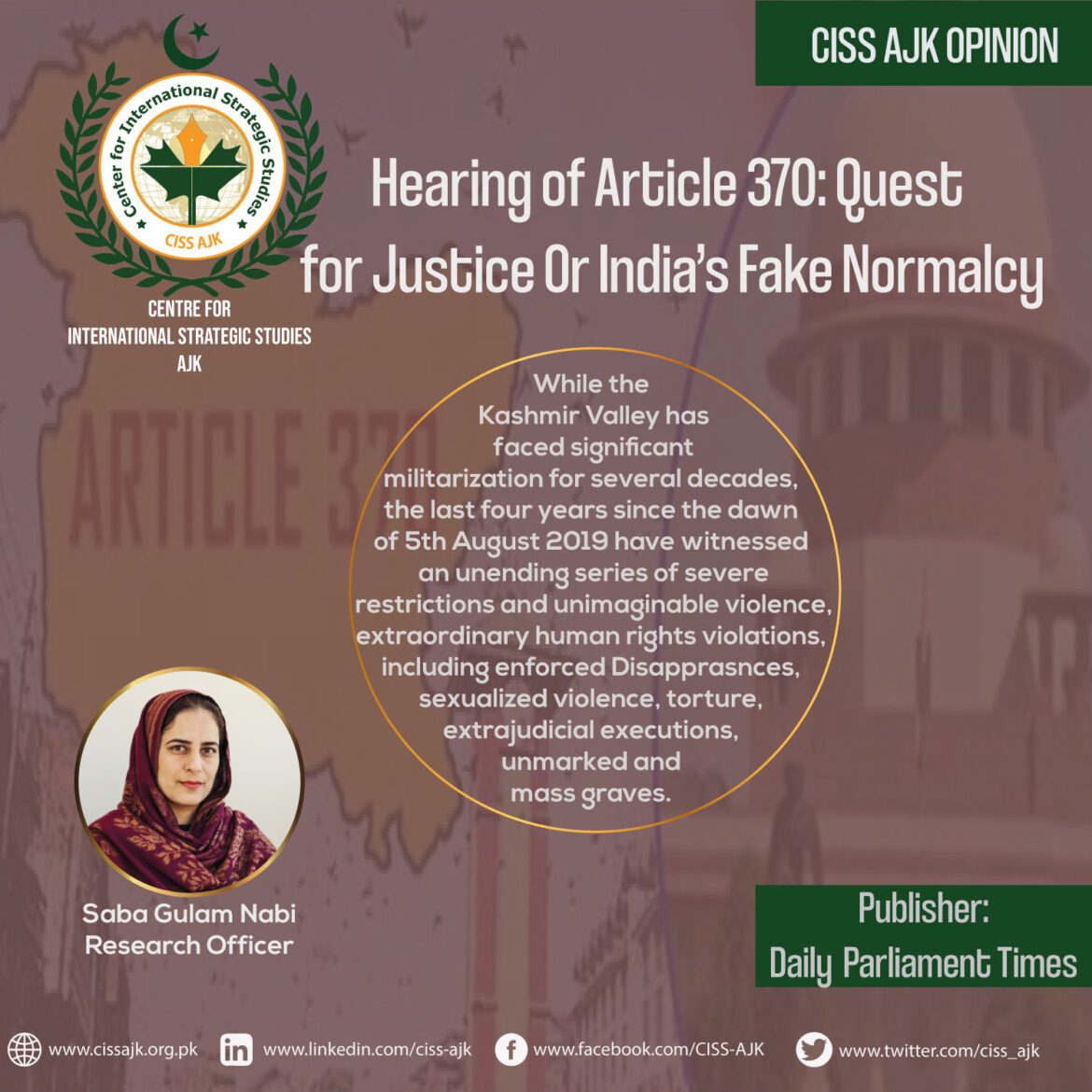528
Today, the situation in the Indian Illegally Occupied Jammu and Kashmir (IIOJK) region paints a grim picture characterized by perpetual violence and an unchecked display of authority by the Indian security forces. This reality has drastically curtailed the basic liberties of Kashmiris, leading to an alarming decline in the quality of life for the ordinary citizen. The approximately 4 million-strong population of the Kashmir Valley are left at the mercy of an overwhelming presence of one million military personnel, a lieutenant governor, and a handful of bureaucrats.
While the Kashmir Valley has faced significant militarization for several decades, the last four years since the dawn of 5th August 2019 have witnessed an unending series of severe restrictions and unimaginable violence, extraordinary human rights violations, including enforced Disapprasnces, sexualized violence, torture, extrajudicial executions, unmarked and mass graves, internet blackouts etc. Following this “unconstitutional” change in the constitution, the Modi regime imposed a strict curfew and lockdown throughout the length and breadth of the valley, which was later compounded by the Covid-19 lockdown. This lockdown extended for nearly three years, and although the so-called curfew has now been lifted, various restrictions have been enforced in the valley through the utilization of security forces. The Modi regime’s claim that revoking Article 370 would bring peace to the conflict-ridden region has proven to be an illusion. Instead, the Indian government has had to resort to the use of force to suppress the mounting sentiments of the Kashmiri people.
The use of force to get the false and “unrealistic” claim of normalcy has transformed Kashmir into a sombre graveyard, with a prevailing atmosphere of fear stifling any open expression of dissent. Despite these efforts, the people of Kashmir have not embraced India wholeheartedly, and the Modi’s dream of integrating the region into India remains unfulfilled. While the Indian government may have attempted to lure the population with promises of development and economic growth, the hearts and minds of the Kashmiris remain unswayed. The recent decision of Justice Chandrachud to review the case of abrogation in the Indian Supreme Court speaks volumes about the “claim of normalcy” but in reality there is no normalcy. It appears that the realization has dawned that force alone cannot quell the invincible spirit of the Kashmiri people. India has taken advantage of the removal of Article 370 in various ways.
On one side, India aimed to restore peace and normalcy in Kashmir. To demonstrate to the global community that the situation in Kashmir is stable, India organized a G-20 meeting in Srinagar. Recentlythe government allowed the Muharram Procession for the first time since 1989 to convey that the situation in Kashmir has return to normal.On the flip side, India has gained public support by revoking Article 370. Interestingly, over the past four years, the legal case related to Article 370 has not been pursued in Indian courts. However, as the 2024 elections approach, the BJP intends to reintroduce the case in court to seek validation. This has two purposes: first, it will prove to the world that the action was legally justified and endorsed by the judiciary, and second, it will earn domestic support in elections 2024 by claiming resolution of a longstanding seven-decade conflict. In the next phase, India is altering the demographics by encouraging Hindus to settle in the Kashmir Valley. This strategy aims to ensure that even in a potential future plebiscite; India would have a majority of votes, portraying the fulfilment of its international obligation. India has realized that it cannot win over the hearts of Kashmiris solely through incentives. The primary approach to gaining majority support in a plebiscite seems to lie in changing the demographic composition of the Kashmir Valley. Nevertheless, achieving this goal is a lengthy process that significantly relies on the court’s decision. Throughout this process, the ones who will suffer are the Kashmiris. The global community has a moral responsibility to address this issue and urge India to cease suppressing the voices of the impoverished Kashmiri population.Their struggle for justice and peace continues. The conflict must be resolved according to the Resolutions of the United Nations.

